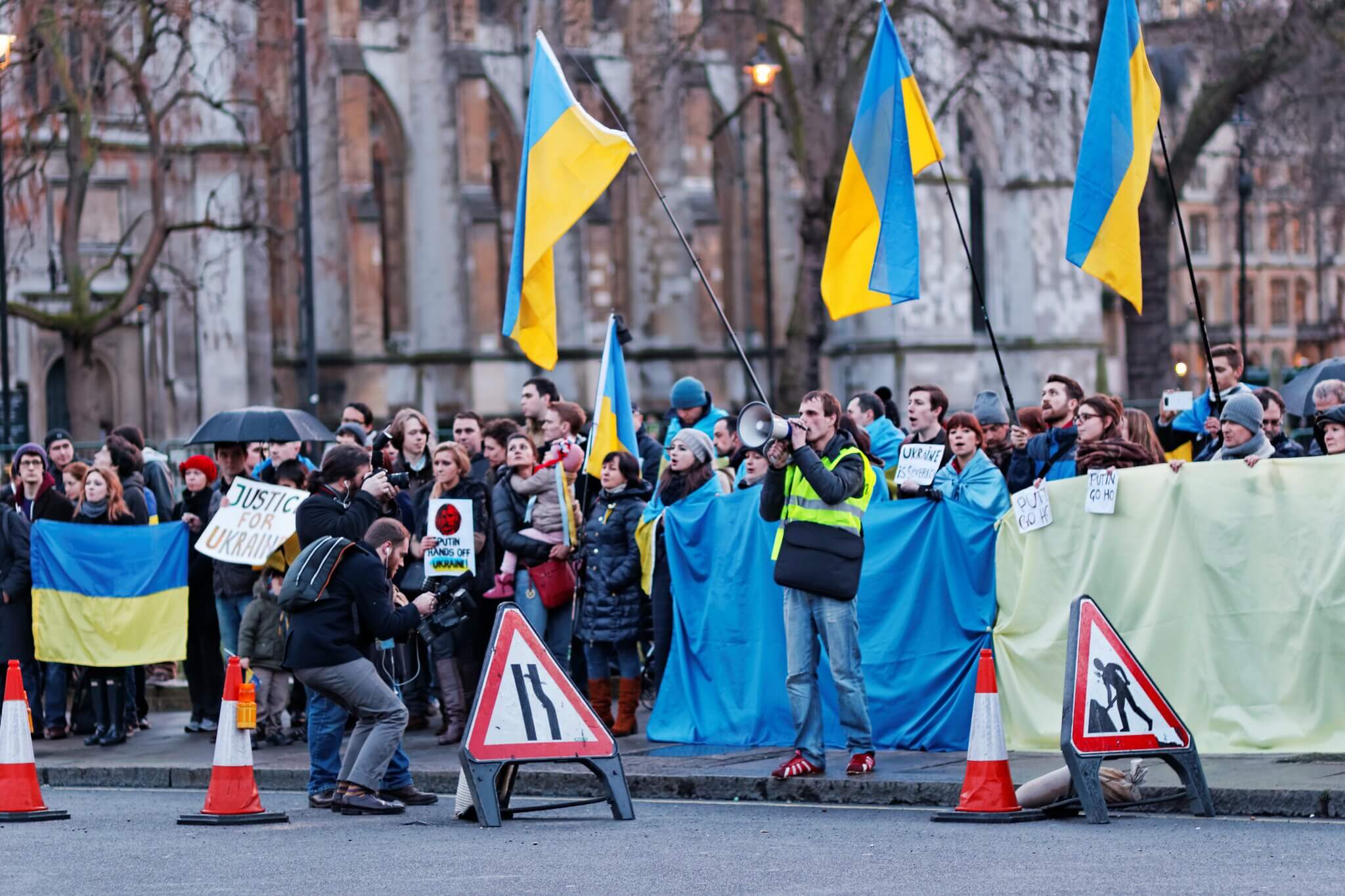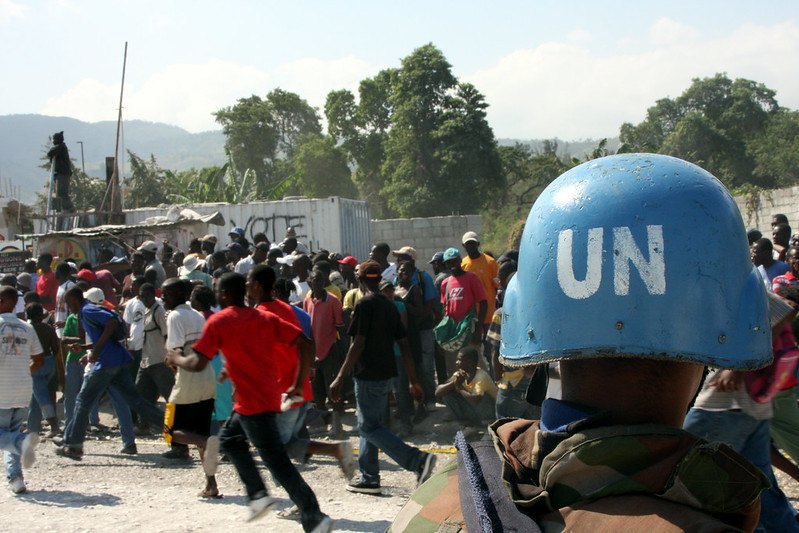Ukraine’s Precarious Pursuit of Justice Through In Absentia Trials
Ukraine’s practice of trying Russian military officials in absentia for war crimes could be at odds with the prescribed international law.

In April 2024, Vladik Nebiev, a 30-year-old Russian junior sergeant, was found guilty of committing systemic sexual violence against a woman in the occupied Kherson region. After assaulting her repeatedly over the course of two months in 2022, he returned to Russia. Nebiev was sentenced to 12 years in prison for war crimes, under Article 438 of the Criminal Code of Ukraine—without setting foot in a Ukrainian courtroom.
In the three years since Russia launched its full-scale invasion, the Ukrainian Prosecutor General’s Office has documented more than 150,000 alleged war crimes. The prosecutor has submitted more than 500 indictments to Ukrainian courts under Article 438 of the country’s criminal code, which categorizes war crimes as cruel treatment of prisoners of war, deportation of civilian population for forced labor, violations of the rules of the warfare under international law, and more. As of January 2025, Ukrainian courts sentenced more than 100 military officials, including Nebiev, for their crimes through in absentia trials.
Ukraine’s in absentia trials are an attempt to overcome a significant barrier to justice and the judicial process—the whereabouts of the defendants. In any ongoing war, perpetrators of alleged war crimes can be difficult to locate. In this war, some of the accused may have returned to Russia; others may already be dead.
By conducting trials in absentia, courts can achieve a degree of accountability and potential closure for the victims of the crimes. However, because of the absence of the defendants in these trials, legal experts have advised Ukrainian courts to uphold defendants’ rights and conduct trials within the bounds of international law—a tricky balancing act while attempting to secure proper justice for victims.
In Absentia Trials in Ukrainian Law
As a civil law jurisdiction, Ukraine’s Criminal Procedure Code permits trials in absentia. There are two stages to this process: a special pre-trial investigation and a trial in absentia. The code can first permit a special pre-trial investigation if the suspect is evading criminal liability and is on the interstate or international wanted list. Subsequent provisions of Article 297 further explain the steps an investigator or public prosecutor must take in order to apply to conduct a special pre-trial investigation. To apply, the motion must specify a description of the criminal offense, its legal qualification, the grounds of suspicion, proof that the individual is on the interstate or international wanted list, and a statement of circumstances regarding the suspect’s evasion of criminal liability. Article 297-5 explains the procedure for alerting the suspect of the summons before the special pre-trial investigation:
Article 297-5. The procedures for delivering procedural documents to the suspect during special pre-trial investigation
1. In case of conducting special pre-trial investigation the summons shall be sent to the last known address of residence or staying of the suspect and shall be published in national mass media and official websites of the agencies conducting pre-trial investigation. The suspect shall be deemed to have been properly informed about the summons content from the moment of its publishing in national mass media.
Once the investigator or public prosecutor has taken the steps prescribed above, the court deems that the suspect is properly informed of the summons. Once satisfied, the judge will grant permission to conduct an absentee pre-trial investigation. If an indictment is submitted after the investigation, the prosecutor will request a “special trial without the participation of the accused,” where the accused’s state-appointed lawyer will defend the individual in court. The procedural aspects of trials in absentia are similar to normal proceedings, including examinations and questioning witnesses. After the judge has delivered a verdict, defendants cannot request a retrial; they can only appeal the decision.
In Absentia Trials in International Law
In absentia trials are a contested means of achieving justice, generally perceived as an exception to the normal judicial process, and not the rule. Trials without the presence of the accused are generally prohibited in common law countries, such as the United States and Canada, and in most international tribunals. However, a defendant’s right to be present at trial is not absolute. There are limited exceptions in international law that can allow the practice of in absentia proceedings and trials, such as when the accused declines to exercise their right to be present, if all reasonable steps have been taken to alert the accused of the trial, or if the accused is disruptive in the courtroom. For example, in the past year, the Council of Europe, in its advocacy for a Special Tribunal for the Crime of Aggression against Ukraine to try senior Russian political and military officials, has emphasized that in absentia trials and proceedings would be possible where “the interests of justice so require and where the person concerned waives his or her right to participate in the proceedings or all reasonable steps have been taken to secure his or her presence but to no effect.” Despite these niche exceptions, Ukraine must ensure that its domestic practices align with the prescribed international law.
Ukraine has ratified several human rights treaties that refer to the presence of the accused throughout a trial and in proceedings, notably the International Convention on Civil and Political Rights (ICCPR). Article 14(3)(d) of the ICCPR guarantees the defendant, in full equality, “to be tried in his presence and to defend himself in person or through legal assistance of his own choosing.” In order to comply with the ICCPR, international tribunals like the International Criminal Court (ICC) and several ad-hoc tribunals have prohibited absentia trials in their statutes.
In 1983, the United Nations Human Rights Committee (HRC), which monitors the implementation of the ICCPR and is distinct from the United Nations Human Rights Council, determined in Mbenge v. Zaire that there are specific circumstances where in absentia proceedings, though not necessarily trials, are permissible. For instance, when the accused declines to exercise their right to be present, even though they were informed of the proceedings in advance through all necessary steps. The HRC further determined that the nature of in absentia trials, in their view, is not illegal per se, but that a state’s failure to take the necessary steps can violate the defendant’s rights under Article 14(3). The HRC also wrote in General Comment 13 that “when exceptionally for justified reasons trials in absentia are held, strict observance of the rights of the defence is all the more necessary.”
Ukraine has also ratified the European Convention on Human Rights (ECHR), which does not explicitly mention trials in absentia but guarantees the right to a fair trial in Article 6(3). Under Article 6(3), anyone charged with a criminal offense has the right to “be informed promptly, in a language which he understands and in detail, of the nature and cause of the accusation against him” and “to defend himself in person or through legal assistance.” The European Court of Human Rights (ECtHR), which interprets the convention, further determined in Colozza v. Italy that Article 6 of the ECHR guarantees that the accused is “entitled to take part in the hearing.” And in 2009, the ECtHR established the “knowing and intelligent waiver” standard in Pishchalnikov v. Russia, referring to the defendant’s right to voluntarily relinquish his right to counsel. The ECtHR determined in Sejdovic v. Italy that if there is any ambiguity regarding the defendant’s knowledge of the proceedings or the verdict—a potential violation of Article 6—the state must guarantee a retrial. In 2006, Ukraine adopted the special Law on the Enforcement of Judgements and Application of Practice of the ECtHR, which makes the court’s decisions enforceable under the country’s law.
Despite the exceptions and remedies in these treaties, in absentia trials are prohibited in the statutes of most international criminal courts including ad-hoc tribunals, such as the International Criminal Tribunal for the former Yugoslavia (ICTY) and the International Criminal Tribunal for Rwanda (ICTR). The ICC strictly does not allow for a trial to take place if the accused is not present: Article 63 of the Rome Statute explicitly states that “the accused shall be present during the trial.” The prohibition of absentia trials and proceedings by tribunals has varied over time—and continues to do so. The International Military Tribunal in Nuremberg, Germany, tried an individual in absentia and the Council of Europe’s Special Tribunal initiative is accepting of such practices. But as a state party to the ICCPR and the ECHR, Ukraine is legally bound to protect the rights of an individual under its jurisdiction as outlined in the treaties. In addition to the 2006 law on enforcing the decisions of the ECtHR, Article 9 of the Constitution of Ukraine, states that “international treaties that are in force and are agreed to be binding by the Verkhovna Rada of Ukraine are part of the national legislation of Ukraine, ”
Discrepancies Between Ukrainian and International Law
It is important to recognize that there may be discrepancies between Ukraine’s domestic laws and legal practices, and the international standards established in the treaties the country is obliged to uphold. These discrepancies, or potential deficits in the efforts on the state’s part to ensure that the rights of the defendant are protected, could lead to greater complications.
For instance, Ukraine’s Criminal Procedure Code prescribes that the summons must be sent to the suspect’s last known address and published in mass media and on authorities’ websites. Once those steps have been taken by the investigator or public prosecutor, the suspect is deemed to “have been properly informed,” which may not necessarily be true in practice. The ongoing conflict between Ukraine and Russia has severely strained official lines of communication—the last known address of the suspect may be unreachable, or the suspect may not be able to access Ukrainian media or websites. With a decrease in the effectiveness of these channels, the Ukrainian justice system is left with a limited ability to notify the accused persons and guarantee their informed absence. Thus, the prescribed actions in Ukraine’s Criminal Procedure Code may not fulfill the standard established by the HRC that the defendant was informed “through all necessary steps.”
Another gap between Ukrainian and international law is the right to a retrial. If there is doubt of the defendant’s awareness of the trial, the ECtHR established that the state must guarantee a retrial upon their arrest. Under Ukrainian law, however, a retrial is permitted only if the defendant has been located before the court delivers its verdict. The defendant is only entitled to an appeal, instead of a retrial, after a verdict has been delivered. If Nebiev were to be arrested for his war crimes in Ukraine and claimed there was ambiguity in his knowledge of the proceedings, the ECtHR could find that the state violated his rights under Article 6 of the ECHR. The court could then determine he is guaranteed a retrial—which would directly conflict with Ukraine's law.
These procedural shortcomings could lead to greater consequences. Under Article 3 of the Second Additional Protocol to the European Convention on Extradition of the Council of Europe, states that are party to the convention maintain the right to refuse extradition in situations where a state does not guarantee a retrial for defendants convicted in absentia. If Ukraine does not observe the international standards of allowing a retrial for a defendant who has been convicted in absence, third-party states could refuse extradition of the individuals convicted in the absentia trials.
Given the risk for abuse and miscarriages of justice, in absentia trials must take place in accordance with international law, and authorities should take all appropriate and reasonable steps to protect the rights of the accused. Ukraine should consider ways to close the gap between domestic practices and international law. Ukraine could potentially amend its laws to better conform with the treaties it has ratified and to ensure that the defendant’s rights are upheld. One way to close the gap would be to increase efforts to notify suspects of summons. Expanding the means of informing suspects through social media and other platforms could improve the practices to meet international legal standards.
With stronger safeguards in place, Ukraine’s pursuit of justice will be more meaningful across international law. When the conflict ends, Ukraine will require a grander legal mechanism of international stature that holds perpetrators of every magnitude accountable. Until then, Ukraine’s justice system should consider how it can improve its practices to meet international standards within the existing judiciary.




.jpg?sfvrsn=104df884_5)
